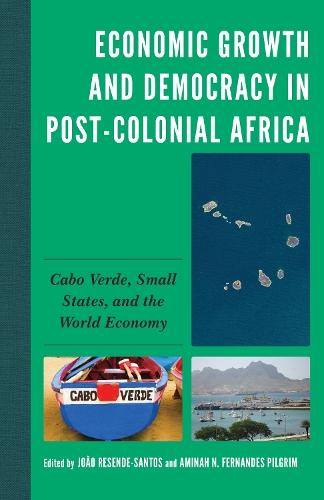
Economic Growth and Democracy in Post-Colonial Africa: Cabo Verde, Small States, and the World Economy
(Hardback)
Publishing Details
Economic Growth and Democracy in Post-Colonial Africa: Cabo Verde, Small States, and the World Economy
By (Author) Joo Resende-Santos
Edited by Aminah N. Pilgrim
Contributions by Abel Djassi Amado
Contributions by Crisanto Barros
Contributions by Edgar Alexandre da Cunha Bernardo
Contributions by Victor Borges
Contributions by Roselma vora
Contributions by Djalita Fialho
Contributions by Terza Alice Silva Lima-Neves
Contributions by Carlos Manuel da Luz Delgado Rocha
Bloomsbury Publishing PLC
Lexington Books
30th March 2022
United States
Classifications
Professional and Scholarly
Non Fiction
International economics
338.96658
Physical Properties
Hardback
340
Width 161mm, Height 227mm, Spine 30mm
667g
Description
In Economic Growth and Democracy in Post-Colonial Africa: Cabo Verde, Small States, and the World Economy, edited by Joo Resende-Santos and Aminah Fernandes Pilgrim, the contributors provide a comprehensive academic analysis of the political economy of Cabo Verde (Cabo Verde) from its independence in 1975 to the present. Democracy and economic growth have been in short supply in post-colonial Africa. Yet the widespread misperception of this vast and diverse continent as experiencing only failure has overshadowed cases of good governance, human development, and social peace. This volume offers a comprehensive analytical narrative on how Cabo Verde (Cape Verde) forged a nation and navigated the world system since independence to achieve some progress. The volume critically examines its political and institutional evolution, foreign affairs, economy, and development policy. The chapters analyze the sources and nature of this relative success as well as underscore the many shortcomings and challenges ahead. As the first volume in English on Cabo Verdes political economy, it serves as both a primary source and sociopolitical study, featuring some of the most accomplished scholars and policy practitioners. This collection aims to fill this gap in the literature and offers a new perspective on democracy and growth in post-colonial Africa.
Reviews
"This is a fresh collection of academic essays by younger Cape Verdean scholars who are placing this newish African republic in its historical, economic, and political context. It projects the challenging and distinguished post-colonial context of Cape Verde and the hurdles and opportunities that lie ahead for this all-too-rare African experience in democracy and development, whose population is largely diasporic."
--Richard Lobban, Rhode Island College"This remarkable book, a tremendous educational resource, assembles distinguished scholars and influential policy practitioners engaging with Cabo Verde's political economy since independence. Cabo Verde has been plagued with resource deprivation, long-term poverty, and a 'fading and failing rural economy, ' and in this first of its kind for English-speaking audiences, the contributors treat these volcanic islands and their geostrategic Atlantic orbits in global contexts as an emerging democracy, central diasporic node, development darling, security partner, and tourism terminus."
--Brandon D. Lundy, Kennesaw State UniversityAuthor Bio
Joo Resende-Santos is associate professor of international studies at Bentley University.
Aminah Fernandes Pilgrim is a faculty member of transnational, cultural, and community studies, Africana studies, and women and gender studies at the University of Massachusetts, Boston.
